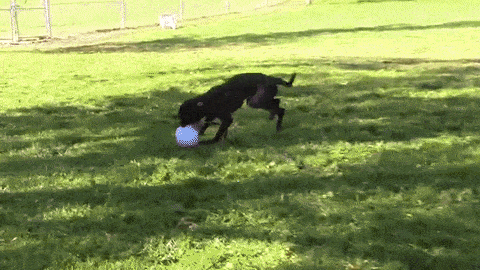Why is my Dog Losing Weight?
Weight loss can be a great thing if your dog is overweight. By maintaining an adequate body condition score for your dog, you can prevent many illnesses and add another year or two to his or her life expectancy. But how much weight loss is acceptable, and how much is too much? What happens when you aren’t trying to get your dog to lose weight, but they’re becoming thinner anyway? What if your dog is losing weight despite eating their regular diet?

What causes sudden weight loss in dogs
Dogs can lose weight for a few different reasons. There are the harmless reasons linked to age and exercise and then there are also numerous illnesses that can cause weight loss in dogs.
Growing or exercising more than usual
Just like in humans, a dog’s body weight can also be impacted by the number of calories that he consumes in a day. If he eats fewer calories, then his body is likely to use body fat for energy. In some cases, your dog can lose too much weight if he isn’t getting the right number of calories. This may be because your young puppy is growing rapidly, or it may be that your dog is extremely active and burns through his calories very quickly.

Source: Giphy
A normal process of ageing
When dogs become older, they tend to progressively lose muscle mass over time. When this occurs and there is no evidence of an underlying disease, then this muscle loss is called sarcopenia. Researchers still don’t know why sarcopenia occurs, but it is theorized that less activity and low protein turnover cause sarcopenia in older dogs.
The presence of disease
There are numerous illnesses that can cause weight loss in dogs. If muscle loss occurs in the presence of a disease, however, then this muscle loss is referred to as cachexia. This degree of muscle loss can be rapid and much more significant than with sarcopenia in dogs.
Heart disease, kidney disease, and cancer are examples of diseases that can cause cachexia in dogs. In these scenarios, dogs may feel very poorly and therefore eat less food than they usually would. At the same time, these dogs need more nutrients to meet the demands of their illnesses. Unfortunately, the body must also contend with inflammatory compounds called cytokines that alter the body’s ability to properly absorb nutrients. All these factors result in sometimes rapid weight loss and cachexia.
Anxious dogs tend to eat less
Anxiety is one of the most common causes in both young and old dogs. Anxious dogs tend to eat less and may have trouble digesting food compared to a non-anxious dog. Therefore, anxious dogs can become underweight if their anxiety is not addressed. Your veterinarian can make some excellent recommendations for your dog’s anxiety but will need to rule out other underlying causes first.

Dental disease may be the cause
If your dog does not feel well, then he may not want to eat. This can happen with dental disease, fever due to an infection, gastrointestinal upset like vomiting and diarrhea, and other diseases.
Diabetes can lead to weight loss
Diabetes is a disease that causes poor regulation of your dog’s blood sugar. Most dogs with diabetes are overweight and have increased thirst, urination, and appetite. If left untreated, then diabetic dogs become very ill and may experience lethargy, vomiting, inappetence, and weight loss. For more information on diabetes in dogs, please check out our article.
How can I help my dog maintain a healthy weight?
Sometimes, weight loss can be very subtle, which is why it is important to have your dog’s weight checked at the veterinarian’s office twice a year. Your vet will be able to track your dog’s weight and note any trends. You can also try to keep track of your dog’s weight at home.
If you notice any changes, get your dog checked by a vet
If you are concerned that he is losing weight, then be sure to make an appointment with your vet right away. She will want to know what food your dog is eating, how much he eats, and if he receives any treats. If your dog is quickly losing weight, then he may have a serious illness. In some cases, detecting weight loss early can lead to a prompt intervention and make all the difference in your dog’s treatment. Semi-annual examinations and weigh-ins are important for monitoring trends and diagnosing diseases before they become much more severe.
Identify and treat the cause of their weight loss
Many of the diseases that cause weight loss can be diagnosed with routine blood and urine testing. This includes diseases like diabetes and kidney disease. If your veterinarian hears an abnormal heart rhythm or a heart murmur during your dog’s physical examination, then she may recommend a chest x-ray and an electrocardiogram to rule out heart disease. Dental disease can be detected on a physical exam or during a dental prophylaxis when dental x-rays are performed. Cancer can be more difficult to diagnose with routine testing and so your vet may recommend additional testing like an ultrasound or may refer you to a specialty practice if she cannot determine a cause for your dog’s weight loss. Please check out our article on cancer in dogs for more information.

Provide a high-quality diet
From a nutrition standpoint, you will need to make sure that your dog is on a high-quality diet. Many of the commercially available diets for dogs are properly balanced to ensure that your dog gets all of the necessary nutrients. Dogs who are finicky eaters may benefit from a gradual change to a new flavored diet, and some dogs may prefer wet food versus dry food. Recent reports from the FDA have suggested that grain-free diets for dogs and cats may cause a certain type of heart disease known as dilated cardiomyopathy or DCM. Until we have more information, it is best to avoid grain-free diets unless a veterinary nutritionist has specifically developed a diet for your dog.
Calming products, supplements or anti-anxiety medication
In cases of anxiety, your vet will recommend different things based on the nature of your dog’s anxiety. With separation anxiety, for example, your vet will go over behavior modification tactics such as avoiding visual cues (i.e. things that might set off your dog like grabbing shoes or car keys) and may prescribe an anti-anxiety medication like fluoxetine. Calming products and supplements may also be useful. Once your dog’s anxiety is addressed, then he may begin to eat better and gain weight.

If you suspect that your dog is losing weight, then make sure to contact your veterinarian for an examination and routine blood and urine testing. Together, you and your vet can determine the best way to help your dog!
The post Why is my Dog Losing Weight? appeared first on VetBabble.




Post a Comment